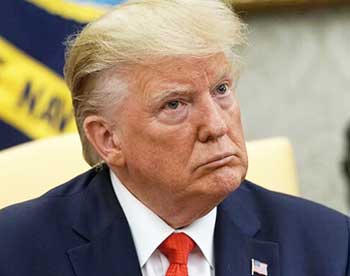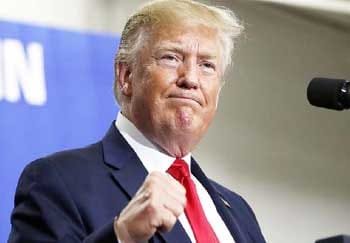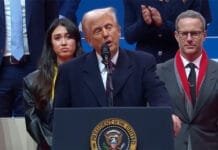INVC NEWS
Washington – : In recent news, the former US President Donald Trump has found himself surrounded by criticism from his own party leaders following a statement on North Korea. The situation arose when North Korea joined the Executive Board of the World Health Organization (WHO), along with nine other countries, to collectively set standards related to global healthcare.
In a surprising turn of events, Trump took to his social media platform, Truth Social, to congratulate the North Korean dictator Kim Jong Un on securing an important position within the WHO. However, it should be noted that Trump misspelled Kim Jong Un’s name as “Kim Jung” in his message, drawing attention to the lack of attention to detail.
Nikki Haley, who was involved in the race to become a presidential candidate from the Republican Party, swiftly responded to Trump’s message. She pointed out that Kim Jong Un has been widely criticized for starving his own people. In light of this, Haley deemed it nonsensical to grant such a significant role to North Korea within the WHO.
The congratulatory message from Trump and the subsequent criticism from party leaders have sparked intense discussions about the implications of political alliances and the role of diplomacy in global health organizations.
The Importance of WHO Executive Board
The Executive Board of the WHO plays a crucial role in shaping global health policies and initiatives. Composed of member states, the board guides the organization’s strategic direction and decision-making processes. With North Korea’s inclusion, the dynamics within the board are set to change.
While the principle of inclusivity and representation is valued in international organizations, the decision to include North Korea has raised eyebrows due to the country’s controversial human rights records and its leader’s questionable practices. These concerns underscore the complex balance between politics and public health within global institutions.
Trump’s Congratulations and the Controversy
Donald Trump’s congratulatory message to Kim Jong Un ignited a storm of criticism from various quarters. Critics argue that by congratulating Kim Jong Un, Trump is inadvertently endorsing the actions and policies of a dictator. They contend that such gestures undermine efforts to hold North Korea accountable for its human rights abuses and nuclear ambitions.
Moreover, the misspelling of Kim Jong Un’s name in the message has also drawn widespread attention. Critics argue that this demonstrates a lack of attention to detail and raises questions about the credibility and accuracy of Trump’s statements.
Criticism from within Trump’s Party
Nikki Haley’s response to Trump’s message reflects the internal divisions within the Republican Party regarding foreign policy and diplomatic engagements. Haley’s criticism emphasizes the need for a more measured approach when it comes to praising leaders with questionable track records. This dissent within the party highlights the diverse perspectives and disagreements that exist even among prominent Republicans.
Political Alliances and Public Health
The controversy surrounding North Korea’s inclusion in the WHO Executive Board sheds light on the complex interplay between politics and public health. International organizations like the WHO aim to address global health challenges impartially, prioritizing the well-being of individuals worldwide. However, political considerations can sometimes complicate these efforts.
Critics argue that granting significant roles to countries with questionable records on human rights and public health may compromise the integrity and effectiveness of such organizations. On the other hand, proponents of inclusivity argue that engagement and dialogue are necessary to bring about positive change and improve the lives of people in countries with contentious political regimes.
Conclusion
The news of Donald Trump congratulating North Korean dictator Kim Jong Un on his appointment to the WHO Executive Board has caused significant controversy and criticism. The incident highlights the intricate relationship between politics and global health organizations, where decisions made within these institutions can elicit strong reactions and scrutiny.
As the discussions surrounding this event unfold, it is essential to recognize the multifaceted nature of global health governance and the challenges of balancing political considerations with the pursuit of public health objectives. Only through careful deliberation, constructive dialogue, and a commitment to the well-being of all people can we hope to navigate these complex issues and drive positive change on a global scale.
















